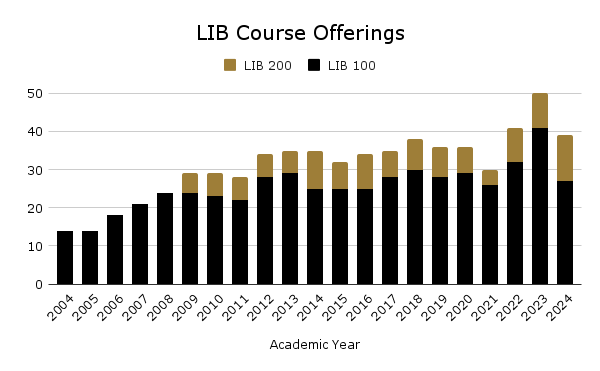History of Credit-Bearing Instruction at ZSR Library
History of Credit-Bearing Instruction at ZSR Library
The Z. Smith Reynolds Library at Wake Forest University has been teaching half-semester credit-bearing information literacy courses since the Spring of 2003. What started as a single section of a one-credit course entitled LIB100: Accessing Information in the 21st Century, has since grown into a much larger and consistently successful elective, credit-bearing program. In the 2023-2024 academic year, we taught 39 sections of credit-bearing courses that enrolled a total of 564 students. Over the past two decades, we have renamed LIB100 to Academic Research and Information Issues, and added over a dozen special topics and discipline-specific credit courses to our regular repertoire.
Since its inception, our for-credit program has taught over 660 sections of courses to more than 9500 Wake Forest students.

When we started planning our first course in 2002 The ACRL Information Literacy Standards were just coming out and library administration felt strongly that libraries would be most successful if they participated actively in the academic teaching mission of the institution. Our initial course was a fairly standard 1-credit half-semester Information Literacy course co-taught by several librarians each of whom took ownership of a couple of class sessions. We stayed very close to the IL standards and focused on how to use library resources in an increasingly online information environment. Since that initial course, our curriculum has grown and new requests have come from students, and new issues have arisen (mis- and disinformation, for example) and that has guided our development of new courses. The success of our original course has made the path smooth for us as we broadened out to 1.5 credit courses and courses on a wide variety of information topics.
As new standards such as the ACRL Framework for Information Literacy have been introduced, and new technologies and information ecosystems have emerged, we have adapted our courses to not only continue to prepare students for navigating the research environment, but also to be engaged consumers of information of all types. This allows our faculty who teach courses to develop them with a certain degree of freedom and flexibility. Our learning objectives for the program are not prescriptive, but are instead intended to allow instructors space for experimentation and creativity as they develop their courses. This spirit of academic freedom is what has launched numerous LIB200 level courses which focus on subjects such as business and accountancy, humanities, social science, science, mis/dis-information, critical information literacy, and archives and primary sources. For a full list of courses in our curriculum and to see sample syllabi – see this page.
The 20 years we have spent developing these courses has solidified our reputation as partners in the academic mission of the university. It has allowed us to meet critical needs on campus, while also allowing us to pursue our pedagogical goals and interests along the way.